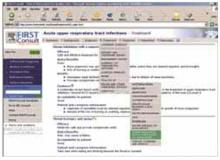Patient handouts
FC-Web contains more than 450 patient education monographs.
The monographs have 3 main tabs. The first 2—View English and View Spanish—have drop-down menus offering handout choices of “Diagnosed Patient” and “General Information.” The third tab, Actions, allows users to customize handouts (add physician’s name, patient’s name, personalized instructions, etc). Defaults can be saved. Printouts are about 3 “airy” pages with liberal use of white space, large type, and bullet points. They are very basic and easy to read.
Handout deficiencies. Inexplicably, hepatitis A and B are included, but not hepatitis C, which would be the most useful information for our practices.
Occasional minor discrepancies exist between handouts and disease monographs. For example, the Acute Upper Respiratory Tract Infection handout says nothing about echinacea or zinc. However, the related monograph states “Echinacea and zinc supplements may be effective in reducing the duration and severity of common cold symptoms.”
Procedure files
Procedure Files contains 30 to 40 procedure monographs, including video clip illustrations of key portions; users have a choice of viewing these with Windows Media Player, RealPlayer, or QuickTime. Reference Centers contains 3 monographs: “Bioterrorism,” “Contraception,” and “Pregnancy” (as of May 2004). Although few in number, these Reference Centers are valuable point-of-care tools.
Medical conditions
We would expect Medical Conditions to be the workhorse section for most physicians. FC-Web advertises that it contains more than 450 conditions.
Rapid access to information. The best feature of this core section is its organization of information—eminently logical, extremely easy to navigate, bulleted, and extensively hyperlinked, taking full advantage of the e-medium.
To illustrate the outstanding layout and hyperlinking, if a user floats the cursor over a tab (eg, Diagnosis or Treatment) in a disease monograph, a menu of subsections drops down (Figure 5). Floating the cursor over some subsections produces a menu of additional options within that subsection. Furthermore, once selected, the resulting information is often extensively hyperlinked to related or more detailed information.
Generic drug names only. Throughout, FIRSTConsult sticks to generic drug names; if the user is uncertain what cefdinir or tamsulosin is, FIRSTConsult will offer no help.
Generous detail. In terms of content, Medical Conditions distills information into bullet points. FC-Web has more depth than, for example, Griffith’s 5-Minute Consult. Also, as a Web-based tool, FC-Web categorizes information multi-dimensionally with the horizontal main tabs plus drop-down, floating subcategories, allowing expeditious jumps to desired information. This organization facilitates rapid access to information.
Superb summary for point-of-care use. The Summary of Therapeutic Options subcategory of the Treatment section is particular noteworthy—an outstanding feature for busy clinicians—and concrete evidence that FC-Web was truly designed with point-of-care in mind. In this subsection, options are listed by bullet points and very briefly described (1 or 2 lines), which allows easy visual scanning. Each option (eg, medication) is then hyperlinked to its more detailed description (eg, dosage, route, etc) in the section, Drugs and Other Therapies: Details.
Sometimes, FC-Web fails to provide “drug of choice” recommendations, listing interventions randomly, which hinders rapid, point-of-care decision-making.
FIGURE 5
Typical FIRSTConsult monograph
Putting FC-Web to the test
FC-Web answered all general questions for which a monograph existed:
- What is the preferred therapy for head lice? (“Permethrin: … Treatment of choice for uncomplicated pediculosis.”)
- At what aneurysm diameter should a patient with an abdominal aortic aneurysm be referred? (“In general, patients with aneurysms larger than 5 cm in diameter, symptomatic aneurysms, or rapidly enlarging aneurysms should be considered for repair. Treatment for aneurysms between 4 and 5 cm is controversial.”)
- What is the basic workup for kidney stones?
- What are the indications for and monitoring of hydroxyurea for adults with sickle cell anemia?
- What are the therapeutic options for mycobacterium avium complex in an HIV-positive patient?
- How should one follow pulmonary sarcoid when tapering steroids? (A link to an external guideline was especially informative.)
Surprising shortcomings. FC-Web’s Medical Conditions section includes some less common entities—restless legs syndrome, Osgood-Schlatter’s disease, for example—but no monographs are devoted to conditions such as SIADH, paroxysmal supraventricular tachycardia, or portal or pulmonary hypertension.
Contact Information
FIRSTConsult, Customer Services, open Monday to Friday, 7:30 am to 7:00 pm Central Time; 1-800-401-9962. Web site: www.FIRSTConsult.com; e-mail contact available through web site, including subscription information.
Pricing
Physicians: $149; $109 if MDConsult subscription also purchased separately.
Residents/Students: $89
Price includes 1 year of Web access and hand-held updates; components are not available separately. After 1 year, hand-held content continues to function (not “time-bombed”) but renewal necessary for updates. Discount pricing available for groups of as few as 2 individuals.
30-day free trial of Web content with registration at www.FIRSTConsult.com. Free trial of partially functional handheld content through handheld link.
Minimum Requirements
Desktop: Windows PC with Windows 95; Macintosh PC with OS 9; Internet connection; Internet Explorer version 5.0 or Netscape version 6.2.
Palm-OS handheld devices: PalmOS version 3.5.3 with 4 MB of RAM, Palm Desktop 4.0. Additional memory or memory expansion card necessary to run larger products.
Pocket PC handheld devices: Pocket PC with ActiveSync (installed on the desktop computer); 32MB RAM; StrongARM processor.


